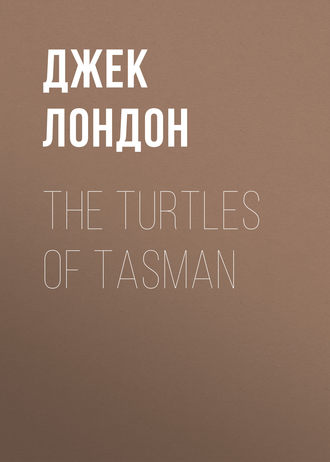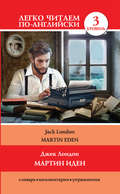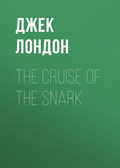
Джек Лондон
The Turtles of Tasman
IV
Noted for his daring and success as a surgeon, through the days and weeks that followed Linday exceeded himself in daring and success. Never, because of the frightful mangling and breakage, and because of the long delay, had he encountered so terrible a case. But he had never had a healthier specimen of human wreck to work upon. Even then he would have failed, had it not been for the patient's catlike vitality and almost uncanny physical and mental grip on life.
There were days of high temperature and delirium; days of heart-sinking when Strang's pulse was barely perceptible; days when he lay conscious, eyes weary and drawn, the sweat of pain on his face. Linday was indefatigable, cruelly efficient, audacious and fortunate, daring hazard after hazard and winning. He was not content to make the man live. He devoted himself to the intricate and perilous problem of making him whole and strong again.
"He will be a cripple?" Madge queried.
"He will not merely walk and talk and be a limping caricature of his former self," Linday told her. "He shall run and leap, swim riffles, ride bears, fight panthers, and do all things to the top of his fool desire. And, I warn you, he will fascinate women just as of old. Will you like that? Are you content? Remember, you will not be with him."
"Go on, go on," she breathed. "Make him whole. Make him what he was."
More than once, whenever Strang's recuperation permitted, Linday put him under the anæsthetic and did terrible things, cutting and sewing, rewiring and connecting up the disrupted organism. Later, developed a hitch in the left arm. Strang could lift it so far, and no farther. Linday applied himself to the problem. It was a case of more wires, shrunken, twisted, disconnected. Again it was cut and switch and ease and disentangle. And all that saved Strang was his tremendous vitality and the health of his flesh.
"You will kill him," his brother complained. "Let him be. For God's sake let him be. A live and crippled man is better than a whole and dead one."
Linday flamed in wrath. "You get out! Out of this cabin with you till you can come back and say that I make him live. Pull – by God, man, you've got to pull with me with all your soul. Your brother's travelling a hairline razor-edge. Do you understand? A thought can topple him off. Now get out, and come back sweet and wholesome, convinced beyond all absoluteness that he will live and be what he was before you and he played the fool together. Get out, I say."
The brother, with clenched hands and threatening eyes, looked to Madge for counsel.
"Go, go, please," she begged. "He is right. I know he is right."
Another time, when Strang's condition seemed more promising, the brother said:
"Doc, you're a wonder, and all this time I've forgotten to ask your name."
"None of your damn business. Don't bother me. Get out."
The mangled right arm ceased from its healing, burst open again in a frightful wound.
"Necrosis," said Linday.
"That does settle it," groaned the brother.
"Shut up!" Linday snarled. "Get out! Take Daw with you. Take Bill, too. Get rabbits – alive – healthy ones. Trap them. Trap everywhere."
"How many?" the brother asked.
"Forty of them – four thousand – forty thousand – all you can get. You'll help me, Mrs. Strang. I'm going to dig into that arm and size up the damage. Get out, you fellows. You for the rabbits."
And he dug in, swiftly, unerringly, scraping away disintegrating bone, ascertaining the extent of the active decay.
"It never would have happened," he told Madge, "if he hadn't had so many other things needing vitality first. Even he didn't have vitality enough to go around. I was watching it, but I had to wait and chance it. That piece must go. He could manage without it, but rabbit-bone will make it what it was."
From the hundreds of rabbits brought in, he weeded out, rejected, selected, tested, selected and tested again, until he made his final choice. He used the last of his chloroform and achieved the bone-graft – living bone to living bone, living man and living rabbit immovable and indissolubly bandaged and bound together, their mutual processes uniting and reconstructing a perfect arm.
And through the whole trying period, especially as Strang mended, occurred passages of talk between Linday and Madge. Nor was he kind, nor she rebellious.
"It's a nuisance," he told her. "But the law is the law, and you'll need a divorce before we can marry again. What do you say? Shall we go to Lake Geneva?"
"As you will," she said.
And he, another time: "What the deuce did you see in him anyway? I know he had money. But you and I were managing to get along with some sort of comfort. My practice was averaging around forty thousand a year then – I went over the books afterward. Palaces and steam yachts were about all that was denied you."
"Perhaps you've explained it," she answered. "Perhaps you were too interested in your practice. Maybe you forgot me."
"Humph," he sneered. "And may not your Rex be too interested in panthers and short sticks?"
He continually girded her to explain what he chose to call her infatuation for the other man.
"There is no explanation," she replied. And, finally, she retorted, "No one can explain love, I least of all. I only knew love, the divine and irrefragable fact, that is all. There was once, at Fort Vancouver, a baron of the Hudson Bay Company who chided the resident Church of England parson. The dominie had written home to England complaining that the Company folk, from the head factor down, were addicted to Indian wives. 'Why didn't you explain the extenuating circumstances?' demanded the baron. Replied the dominie: 'A cow's tail grows downward. I do not attempt to explain why the cow's tail grows downward. I merely cite the fact.'"
"Damn clever women!" cried Linday, his eyes flashing his irritation.
"What brought you, of all places, into the Klondike?" she asked once.
"Too much money. No wife to spend it. Wanted a rest. Possibly overwork. I tried Colorado, but their telegrams followed me, and some of them did themselves. I went on to Seattle. Same thing. Ransom ran his wife out to me in a special train. There was no escaping it. Operation successful. Local newspapers got wind of it. You can imagine the rest. I had to hide, so I ran away to Klondike. And – well, Tom Daw found me playing whist in a cabin down on the Yukon."
Came the day when Strang's bed was carried out of doors and into the sunshine.
"Let me tell him now," she said to Linday.
"No; wait," he answered.
Later, Strang was able to sit up on the edge of the bed, able to walk his first giddy steps, supported on either side.
"Let me tell him now," she said.
"No. I'm making a complete job of this. I want no set-backs. There's a slight hitch still in that left arm. It's a little thing, but I am going to remake him as God made him. Tomorrow I've planned to get into that arm and take out the kink. It will mean a couple of days on his back. I'm sorry there's no more chloroform. He'll just have to bite his teeth on a spike and hang on. He can do it. He's got grit for a dozen men."
Summer came on. The snow disappeared, save on the far peaks of the Rockies to the east. The days lengthened till there was no darkness, the sun dipping at midnight, due north, for a few minutes beneath the horizon. Linday never let up on Strang. He studied his walk, his body movements, stripped him again and again and for the thousandth time made him flex all his muscles. Massage was given him without end, until Linday declared that Tom Daw, Bill, and the brother were properly qualified for Turkish bath and osteopathic hospital attendants. But Linday was not yet satisfied. He put Strang through his whole repertoire of physical feats, searching him the while for hidden weaknesses. He put him on his back again for a week, opened up his leg, played a deft trick or two with the smaller veins, scraped a spot of bone no larger than a coffee grain till naught but a surface of healthy pink remained to be sewed over with the living flesh.
"Let me tell him," Madge begged.
"Not yet," was the answer. "You will tell him only when I am ready."
July passed, and August neared its end, when he ordered Strang out on trail to get a moose. Linday kept at his heels, watching him, studying him. He was slender, a cat in the strength of his muscles, and he walked as Linday had seen no man walk, effortlessly, with all his body, seeming to lift the legs with supple muscles clear to the shoulders. But it was without heaviness, so easy that it invested him with a peculiar grace, so easy that to the eye the speed was deceptive. It was the killing pace of which Tom Daw had complained. Linday toiled behind, sweating and panting; from time to time, when the ground favoured, making short runs to keep up. At the end of ten miles he called a halt and threw himself down on the moss.
"Enough!" he cried. "I can't keep up with you."
He mopped his heated face, and Strang sat down on a spruce log, smiling at the doctor, and, with the camaraderie of a pantheist, at all the landscape.
"Any twinges, or hurts, or aches, or hints of aches?" Linday demanded.
Strang shook his curly head and stretched his lithe body, living and joying in every fibre of it.
"You'll do, Strang. For a winter or two you may expect to feel the cold and damp in the old wounds. But that will pass, and perhaps you may escape it altogether."
"God, Doctor, you have performed miracles with me. I don't know how to thank you. I don't even know your name."
"Which doesn't matter. I've pulled you through, and that's the main thing."
"But it's a name men must know out in the world," Strang persisted. "I'll wager I'd recognise it if I heard it."
"I think you would," was Linday's answer. "But it's beside the matter. I want one final test, and then I'm done with you. Over the divide at the head of this creek is a tributary of the Big Windy. Daw tells me that last year you went over, down to the middle fork, and back again, in three days. He said you nearly killed him, too. You are to wait here and camp to-night. I'll send Daw along with the camp outfit. Then it's up to you to go to the middle fork and back in the same time as last year."
V
"Now," Linday said to Madge. "You have an hour in which to pack. I'll go and get the canoe ready. Bill's bringing in the moose and won't get back till dark. We'll make my cabin to-day, and in a week we'll be in Dawson."
"I was in hope…" She broke off proudly.
"That I'd forego the fee?"
"Oh, a compact is a compact, but you needn't have been so hateful in the collecting. You have not been fair. You have sent him away for three days, and robbed me of my last words to him."
"Leave a letter."
"I shall tell him all."
"Anything less than all would be unfair to the three of us," was Linday's answer.
When he returned from the canoe, her outfit was packed, the letter written.
"Let me read it," he said, "if you don't mind."
Her hesitation was momentary, then she passed it over.
"Pretty straight," he said, when he had finished it. "Now, are you ready?"
He carried her pack down to the bank, and, kneeling, steadied the canoe with one hand while he extended the other to help her in. He watched her closely, but without a tremor she held out her hand to his and prepared to step on board.
"Wait," he said. "One moment. You remember the story I told you of the elixir. I failed to tell you the end. And when she had anointed his eyes and was about to depart, it chanced she saw in the mirror that her beauty had been restored to her. And he opened his eyes, and cried out with joy at the sight of her beauty, and folded her in his arms."
She waited, tense but controlled, for him to continue, a dawn of wonder faintly beginning to show in her face and eyes.
"You are very beautiful, Madge." He paused, then added drily, "The rest is obvious. I fancy Rex Strang's arms won't remain long empty. Good-bye."
"Grant…" she said, almost whispered, and in her voice was all the speech that needs not words for understanding.
He gave a nasty little laugh. "I just wanted to show you I wasn't such a bad sort. Coals of fire, you know."
"Grant…"
He stepped into the canoe and put out a slender, nervous hand.
"Good-bye," he said.
She folded both her own hands about his.
"Dear, strong hand," she murmured, and bent and kissed it.
He jerked it away, thrust the canoe out from the bank, dipped the paddle in the swift rush of the current, and entered the head of the riffle where the water poured glassily ere it burst into a white madness of foam.







